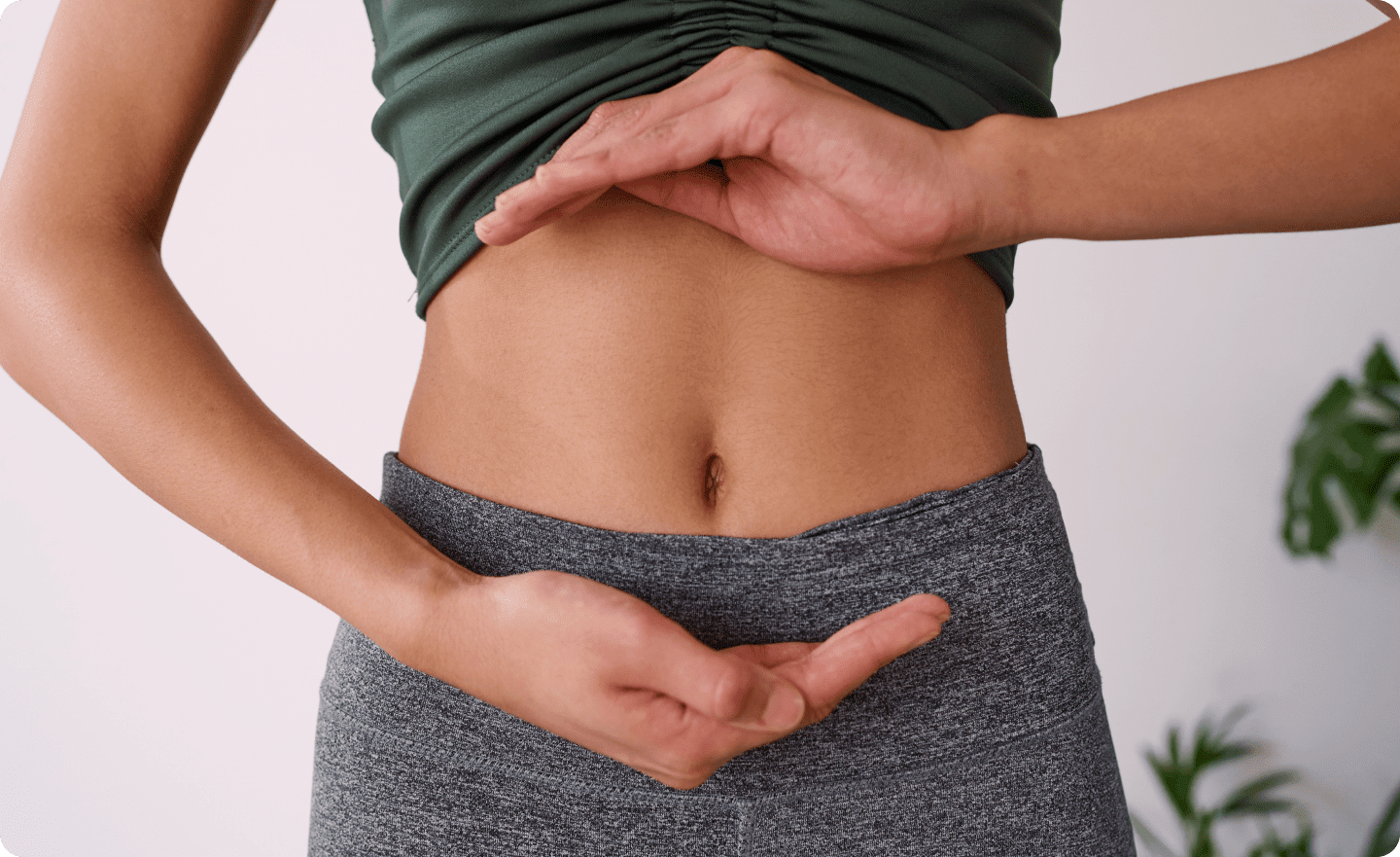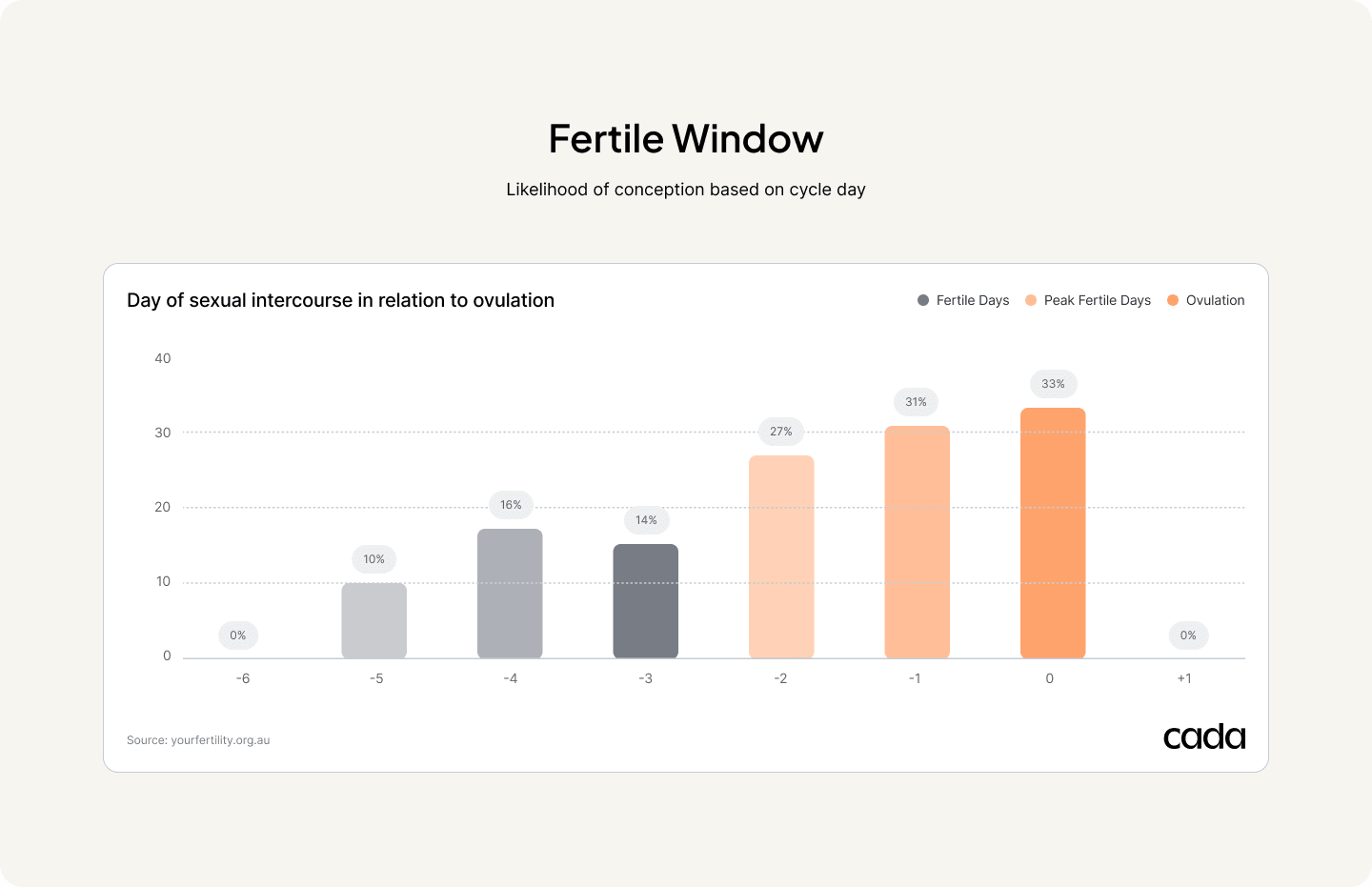Find out how fast you can get pregnant and how the chances vary depending on the day of your cycle.
Everything You Need to Know About Getting Pregnant Fast
- 30% of couples conceive on their first try
- The younger the woman, the higher the chances of pregnancy
- Smoking and alcohol can lower fertility
- Regular sex increases the likelihood of conception during the fertile window
- The egg is only fertile for about 12–24 hours after ovulation
Why Some Couples Conceive Quickly—and Others Don’t
Many couples hoping to start a family wonder: How fast can you get pregnant? Unfortunately, there’s no one-size-fits-all answer. Numerous factors influence how long it takes to conceive.
Making preconception lifestyle changes, such as maintaining a healthy lifestyle and tracking your cycle, can improve your chances of conceiving quickly.
In this article, you’ll learn how quickly pregnancy can happen, how age affects fertility, and why sperm quality plays a crucial role.

How Long Does It Take to Get Pregnant?
Around 30% of women get pregnant within the first cycle of trying. About 75% conceive within six months. After one year of regular, unprotected sex, approximately 85 to 90% of women are pregnant.
After two years of trying without contraception, about 10 to 15% of couples are still childless.
Looking for Support on Your Journey to Parenthood?

At our fertility center in Zurich, we’re here to help you make your dream of having a child come true—quickly and with compassion.
Study on the Effectiveness of Natural Family Planning (NFP) for Couples Trying to Conceive
A German study examined how quickly couples can expect to get pregnant, with a particular focus on the prevalence of infertility and subfertility (reduced ability to conceive).
In this study, a group of 346 women used natural family planning (NFP) methods to increase their chances of getting pregnant. NFP combines several techniques—such as tracking basal body temperature and monitoring cervical mucus—to pinpoint the fertile days of the cycle.
Because these couples knew exactly when to have sex to maximize the chances of conception, poor timing could be ruled out as a reason for not getting pregnant. The results were as follows:
- After 1 month, 38% of couples were pregnant
- After 3 months, 68% were pregnant
- After 6 months, 81% were pregnant
- After 12 months, 92% were pregnant
Out of the 346 women, 310 became pregnant. The remaining 10.4% did not conceive.
If you exclude the women who did not become pregnant within a year, the results look even more encouraging:
- 42% conceived in the first month
- 75% conceived by the third month
- 88% conceived within six months
- 98% conceived by the end of the first year
How long it takes to get pregnant ultimately depends on several factors: how often you have sex, whether you’re timing it around your most fertile days, your age, and whether you or your partner have any fertility problems.

When in My Cycle Am I Most Likely to Get Pregnant?
A woman is most fertile on the day of ovulation—when the ovaries release a mature egg. However, it’s also possible to get pregnant in the days leading up to ovulation, since sperm can survive in the female body for several days.
The exact time of ovulation varies depending on the length of your menstrual cycle. The average cycle lasts between 21 and 35 days. Variations in cycle length usually occur during the follicular phase, which is the time before ovulation. The luteal phase, which lasts from ovulation to the next period, is typically 14 days long.
Even though the fertile window can vary from woman to woman, a large analysis found that the highest chances of conception occur on the day before ovulation and the day of ovulation itself. Most participants in this study were between the ages of 25 and 34.
Here’s a quick summary of the likelihood of conception based on the day of the cycle:

How Does Age Affect Your Chances of Getting Pregnant?
Ovulation and the fertile window can change from cycle to cycle—and they also shift as a woman gets older. Fertility declines with age, especially after the age of 35. By the time a woman is 40, her chances of conceiving per cycle drop to around 10%.
There are two main reasons why it becomes more difficult to get pregnant as women age:
- Egg quantity decreases over time. The ovarian reserve gradually declines starting in the early 30s. After 32, the number of eggs drops more significantly, and this decline accelerates after age 37.
- Egg quality also decreases. Between 30–80% of eggs in women over 40 show chromosomal abnormalities.
In addition, menstrual irregularities become more common with age, and ovulation may become unpredictable. In such cases, fertility treatments can help regulate the cycle and stimulate ovulation.
Certain medical conditions like endometriosis or polycystic ovary syndrome (PCOS) can also make it more difficult to conceive.

12 Tips to Help You Get Pregnant Faster
- Identify Your Fertile Days: If you're trying to conceive, it's important to know the best time to do so—your ovulation day. You can track ovulation using ovulation tests, an ovulation calculator, or cycle monitoring. This helps you recognize patterns or irregularities in your cycle and accurately determine your fertile window.
- Stop Using Birth Control: Many women can get pregnant right after stopping the pill or another form of contraception. The idea that the pill causes infertility is a myth. However, hormonal contraception can mask cycle irregularities, so it may take a little time for your natural cycle—and pregnancy—to resume.
- Have Regular Sex: Successful fertilization is a key step toward pregnancy. Studies show that couples who have sex every day or every other day during the fertile window have the highest chances of conceiving.
- Exercise Regularly: Physical activity not only boosts overall well-being but also improves blood flow to the uterine lining and helps maintain a healthy weight. Women who are overweight or underweight are more likely to have irregular cycles. Keeping your BMI within a healthy range reduces the risk of obesity-related fertility issues.
- Avoid Smoking: Both partners should quit smoking at least three months before trying to conceive. Smoking negatively affects the quality of both sperm and eggs, reducing the likelihood of pregnancy.
- Limit Alcohol Intake: Both partners should limit how much they drink alcohol, as even moderate consumption can impair fertility. Especially in large amounts, alcohol can impair sperm production and quality. In women, it can interfere with implantation and increase the risk of miscarriage during pregnancy.
- Eat a Healthy Diet: A balanced diet supports your fertility and boosts your overall health, making conception more likely. Whole grains, legumes, fruits, vegetables, and high-quality protein sources can boost fertility. It also ensures you and your baby get essential nutrients and minerals. Fast food and highly processed foods should be avoided—one study found that women who frequently ate fast food were 2–3 times more likely to experience fertility issues.
- Consider Supplements: If you have a deficiency, taking supplements may help. Vitamins like C and D, as well as iron, have been shown to support fertility.
- Take Folic Acid: Taking folic acid even before pregnancy can increase your chances of conceiving. During pregnancy, it plays a vital role in the development of the embryo by supporting cell division and reducing the risk of neural tube defects by up to 70%.
- Avoid Lubricants: Some lubricants may interfere with sperm’s ability to pass through the cervix, reducing the chance of fertilization. Although some lubricants claim to be conception-friendly, most can alter vaginal pH and impair sperm motility. To maintain a healthy vaginal environment, it's also best to avoid vaginal douches.
- Reduce Stress: Chronic stress can negatively affect fertility. Stress hormones like cortisol can disrupt the delicate hormonal balance needed for reproduction. This can lead to irregular cycles, absent ovulation, or insufficient endometrial lining in women—and reduced sperm quality and quantity in men. Mindfulness techniques not only reduce stress but also support better mental health, which can positively influence hormone regulation.
- See Your Gynecologist: If you’ve been trying for a year without success (despite regular unprotected sex), it’s time to see a healthcare professional. Hormone testing or a tubal patency test (HyCoSy) can help identify the cause of infertility.
What Role Does Sperm Quality Play in Fertility?
Even if you’re tracking ovulation and having sex regularly, there may be reasons why sperm can’t reach the egg. Researchers estimate that in about 30% of infertility cases, the issue lies solely with the male partner.
Common causes of male infertility include:
- Sperm Morphology: Abnormal size or shape can affect the sperm's ability to fertilize an egg. At least 4% of sperm should have a normal shape.
- Low Sperm Count: A sperm concentration below 16 million per milliliter is considered low (a condition known as oligozoospermia). The lower the sperm count, the lower the chance of natural conception. Prolonged exposure to heat—such as hot baths—has been shown to negatively affect sperm quality.
- Poor Sperm Motility: This means the sperm don't move efficiently enough to reach the egg. At least 42% should be motile.
There are also medical conditions that can impair male fertility, including hypogonadism, infections, varicoceles (enlarged veins in the testicles), surgeries, and diseases like cancer.

Takeaway: Fertility Evaluation After 12 Months of Trying
How quickly you get pregnant is highly individual and depends on a variety of factors. However, most couples conceive within one year of having regular unprotected sex.
Younger women generally have a higher chance of conceiving quickly. As women age—especially from age 35 onwards—fertility naturally declines. Conditions such as endometriosis or PCOS can also make conception more difficult.
Sperm quality also plays an important role. In around 30% of cases, male infertility is the sole reason for an unfulfilled desire to have children.
If pregnancy hasn’t occurred after more than a year, further tests—such as hormone evaluations or a fallopian tube patency test—may be appropriate. A semen analysis for the male partner is also helpful to gain a complete picture.
At our fertility clinic in Zurich, we support you with state-of-the-art diagnostics and short wait times to help you get pregnant as quickly as possible.







